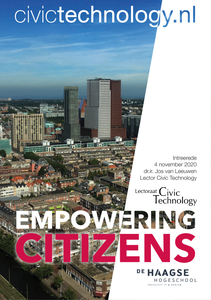Pleidooi voor het nadenken over een alternatief voor het KVB model. Er wordt gepleit voor de ontwikkeling van een nieuw model dat gebruikt maakt van disciplines die kijken naar muziek als sociale praktijk: sociologie, antropologie en ethnomusicologie. Zo zou een rijker model kunnen worden ontwikkeld dat tevens inclusiever en opener is dan het huidige KVB model dat grotendeels centraal staat in het muziekonderwijs op scholen
DOCUMENT
Paper presented at the 31st European Seminar in Ethnomusicology ESEM, Limerick (Ireland), 18/9/2015. This paper presents a case study of ‘Belinda’, a Dutch woman in her early sixties who considers herself at the same time as ‘un-musical’ and musically hyper-sensitive. She is neither an ‘outstanding performer’ nor a ‘maverick’, but rather an idiosyncratic example of late-modern (i.c. Dutch) everyday life musicality.Interesting as her particular case may be, the focus in this paper is theoretical and methodological. Through concisely discussing Belinda’s biography, I will be able to focus, theoretically, on using practice theory as formulated recently by German cultural sociologist Andreas Reckwitz as a possible foundation for studying music in late-modern western societies. Reckwitz considers culture as an inherently hybrid and dynamic arena of shared and contested individual understandings of the world, and sees practices – ‘ways of doing and saying’ – as the locus of culture. Methodologically, I posit – referring to Reckwitz but also to the seminal work of George Herbert Mead and others - that there is no need to think about the individual and the social as two mutually exclusive domains, but rather that the individual is inherently social and therefore the study of music in society (‘music as culture’; or maybe ‘ethnomusicology’) should base itself on a thorough micro-ethnographic study of individuals, rather than on more abstract groups, combining ethnographic methods with insights from qualitative sociology and Grounded Theory.The paper hopes to contribute to theoretical and methodological discussions in ethnomusicology. Because the study of ‘Belinda’ is a strong example of a study by a researcher who has been born and bred in the same context of ‘shared and contested ways of doing and saying’ as the researched, the paper also hopes to contribute to ideas about the methodological particularities of ‘ethnomusicology-at-home’ and about the potential value of ethnomusicological studies of late-modern musicality and musical late-modernity.
DOCUMENT
In ons dagelijkse leven hebben we veel met technologie te maken, vaak met interactieve, informatie-gerichte technologie: als consument doen we online boodschappen – zeker in deze pandemische tijd; als reiziger in het openbaar vervoer plannen en betalen we onze reis met interactieve technologie – nu weliswaar even wat minder; als weggebruiker navigeren we op basis van technologie; en ons energieverbruik in huis wordt ‘smart’ gemeten en geadministreerd. Als burger staan we steeds vaker middels technologie in contact met overheden. Denk aan alle online communicatie met de overheid, zo als de belastingdienst en gemeenten die middels apps, websites en de ‘Berichtenbox’ van ‘MijnOverheid’ met burgers communiceren. En er wordt over burgers en ons gedrag al heel wat data verzameld, door gemeenten, de politie, door bijvoorbeeld de zorgsector. En ook in de publieke ruimte wordt data verzameld – met smart city technologie, zoals camera’s en sensoren – met als doel om de stad veiliger, efficiënter en leefbaarder te maken. Al die ‘big data’ maakt het mogelijk om inzichten te genereren – al dan niet met kunstmatige intelligentie – en besluiten te nemen. We gebruiken technologie ook om als burger zelf actie te ondernemen. Bij de overheid kunnen we met apps melden wat er op straat verbeterd of onderhouden moet worden. Met onze buren zitten we in een WhatsApp groep of NextDoor, om bij te dragen aan de leefbaarheid en veiligheid van de buurt. We kunnen met smart home tools of citizen science kits de luchtkwaliteit meten, binnenshuis, maar ook buitenshuis. We tekenen petities, doen mee aan peilingen en enquêtes. En social networking sites (SNS) worden intensief gebruikt, voor sociale en professionele relaties, maar ook om maatschappelijk actief te zijn, voor het organiseren van het samenleven in een buurt. We weten inmiddels dat social media ook een effectief kanaal zijn om de democratie te beïnvloeden. Burgers komen dus in aanraking met veel verschillende technologieën, met verschillende doelstellingen, resultaten en bijeffecten, en waaraan mensen in allerlei functies en rollen deelnemen. Wat centraal staat in het vakgebied Civic Technology is dat de technologie in dienst staat van het burgerschap.
DOCUMENT
